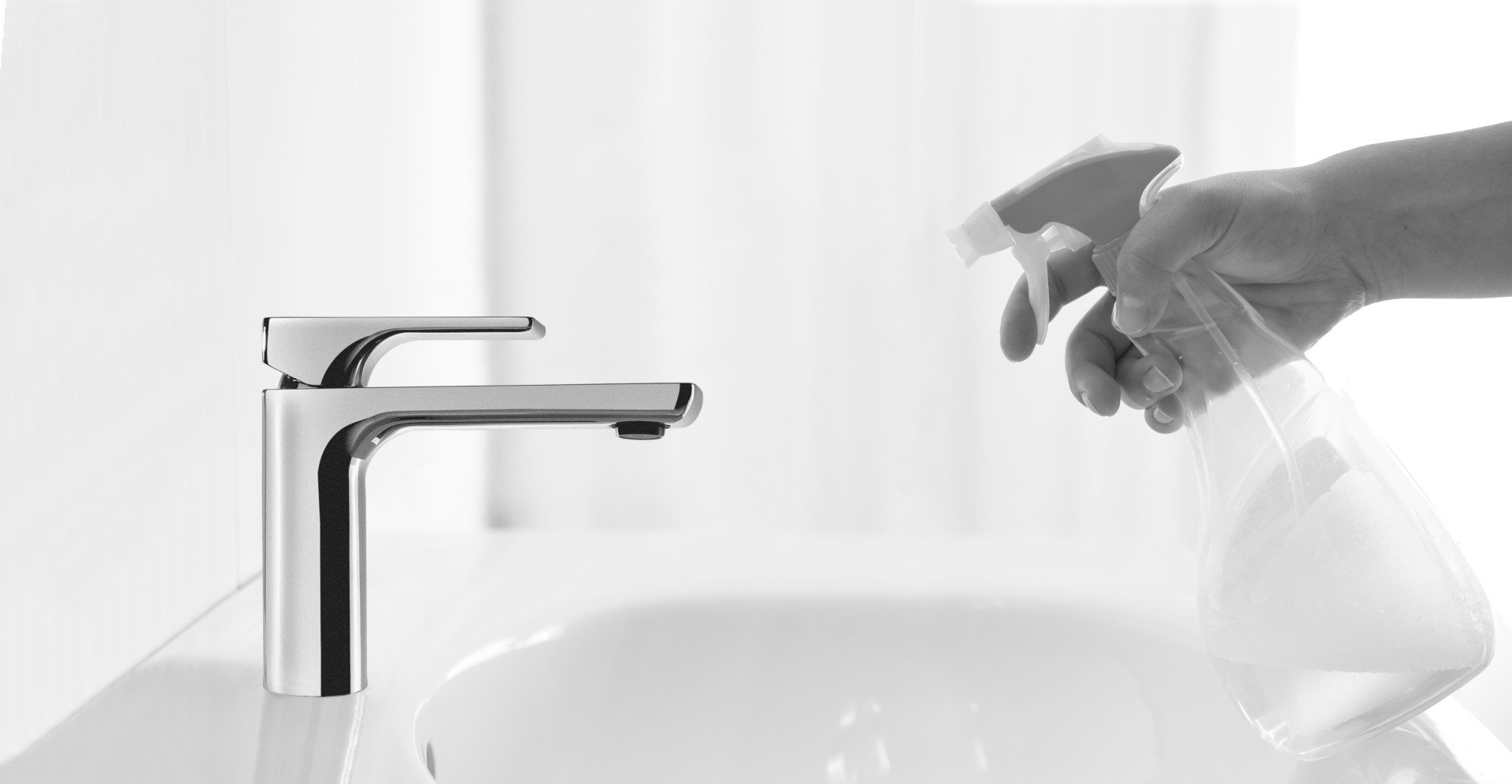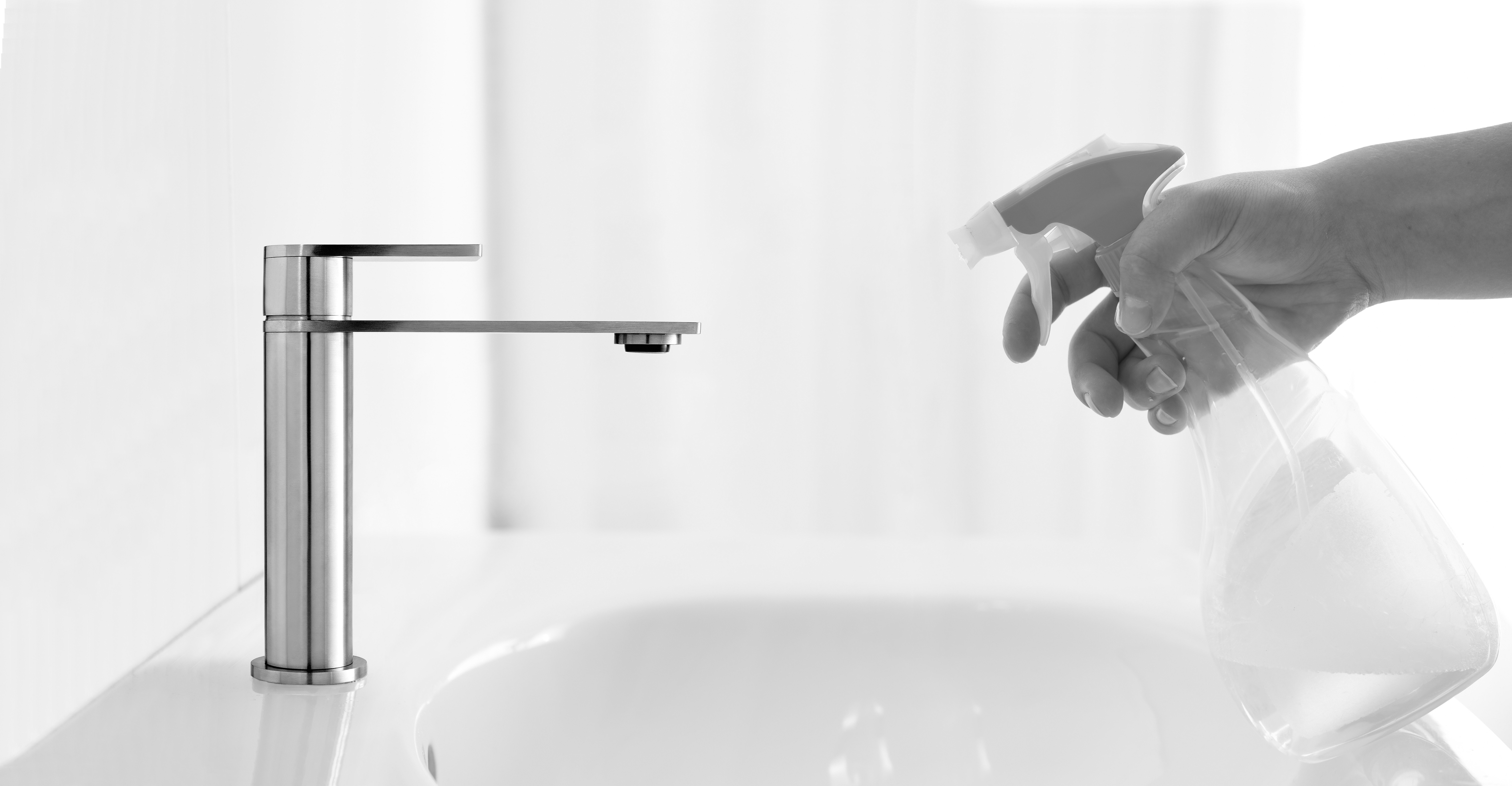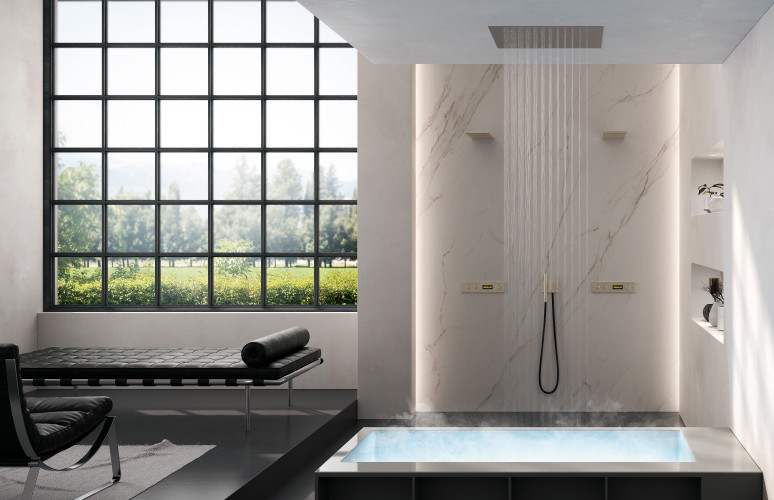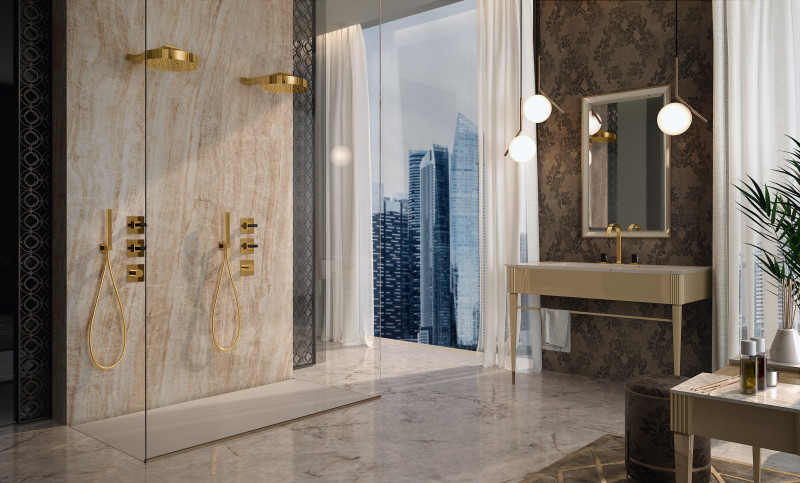Useful tips for the care and maintenance of your taps

Ever wondered how to keep your taps as good as new? It’s often the mistakes we make with cleaning that have a negative impact on the condition of our taps.
So let’s take a specific look at what to do - and what NOT to do - depending on the type of tap. One tip that’s always valid, though, is to keep the use of cleaning products to a minimum!
We’ll be giving you some general information on how to treat brass taps and steel taps, but always remember to check the maintenance indications for the specific products first, because particular cleaning and care instructions may be provided by individual manufacturers or for individual models.
BRASS TAPS
The hardness of mains water varies greatly according to the water source and local geological composition. Water hardness is a critical parameter that can affect correct operation of domestic plumbing systems, including taps. To protect these components, water hardness should be no higher than 10 – 15 French degrees.
With water hardness above this value, installing a water softener becomes a viable solution. This device guarantees a higher level of protection of taps and improves the overall quality of the water used in the home. Adopting this preventive measure can help to reduce maintenance costs and extend the useful life of plumbing systems and fixtures.
CHROME TAPS
WHAT TO DO
For perfect care of your taps dry them after each use with a soft cloth (cotton or microfibre) to prevent the accumulation of hard-to-remove limescale deposits left by water droplets.
If necessary, use natural cleaners to remove limescale or water marks from taps while also protecting the environment. Use a 5% citric acid solution (25 g of citric acid in powder form in half a litre of water). Allow 3 – 5 minutes for the solution to work and then wipe the taps with a soft cloth, taking care not to scratch the surface. Always rinse the taps with plenty of water and dry them thoroughly with a soft dry cloth.
If the aerators are blocked with limescale, remove them and immerse them in the 5% citric acid solution (can be tepid if necessary); limescale deposits will dissolve completely in about ten minutes.
Use isopropyl alcohol to remove any fingerprints or organic residues.
WHAT NOT TO DO
Do not use limescale removers and aggressive or highly corrosive cleaning products (e.g. phosphoric acid, lactic acid, ammonia, sodium hydroxide, sodium hypochlorite). Do not use abrasive sponges under any circumstances (e.g. classic green and yellow sponge scourers, Scotch-Brite pads), stainless steel scouring balls, products containing abrasive granules or microfibre cloths with metal or rigid fibres that could damage the surface irreparably.
Do not leave detergent-soaked cloths or sponges on the taps. Do not leave open packs or bottles of detergent or other highly acidic or corrosive chemical products next to the taps: the resulting vapours that can oxidise or corrode the surfaces in some cases.
COLOURED TAPS
WHAT TO DO
For perfect care of your taps dry them after each use with a soft cloth (cotton or microfibre) to prevent the accumulation of hard-to-remove limescale deposits left by water droplets.
Taps with a coloured finish must be dried with particular care to prevent the accumulation of limescale deposits. Use a 5% citric acid solution (25 g of citric acid in powder form in half a litre of water). Allow 3 – 5 minutes for the solution to work and then wipe the taps with a soft cloth, taking care not to scratch the surface. Always rinse the taps with plenty of water and dry them thoroughly with a soft dry cloth.
If the aerators are blocked with limescale, remove them and immerse them in the 5% citric acid solution (can be tepid if necessary); limescale deposits will dissolve completely in about ten minutes.
Use isopropyl alcohol to remove any fingerprints or organic residues.
IMPORTANT
Use as little detergent as possible.
WHAT NOT TO DO
Do not use scale removers and aggressive or highly corrosive cleaning products (e.g. acetic acid, phosphoric acid, lactic acid, ammonia, sodium hydroxide, sodium hypochlorite, benzyl alcohol). Do not use abrasive sponges under any circumstances (e.g. classic green and yellow sponge scourers, Scotch-Brite pads), stainless steel scouring balls, products containing abrasive granules or microfibre cloths with metal or rigid fibres that could damage the surface irreparably.
Do not leave detergent-soaked cloths or sponges on the taps. Do not leave open packs or bottles of detergent or other highly acidic or corrosive chemical products next to the taps: the resulting vapours that can oxidise or corrode the surfaces in some cases.

STEEL TAPS
The hardness of mains water varies greatly according to the water source and local geological composition. Water hardness is a critical parameter that can affect correct operation of domestic plumbing systems, including taps. To protect these components, water hardness should be no higher than 10 – 15 French degrees.
With water hardness above this value, installing a water softener becomes a viable solution. This device guarantees a higher level of protection of taps and improves the overall quality of the water used in the home. Adopting this preventive measure can help to reduce maintenance costs and extend the useful life of plumbing systems and fixtures.
Our taps are made of AISI 316L stainless steel, a very high quality material that assures long life, a durable finish, and easy maintenance.
Any rust stains that may appear on the tap surface are not caused by the construction material of the taps but rather by external contamination. Therefore, before installing the taps make sure that any ferrous residues of job site operations are completely removed from the surfaces and from the pipes. Correct preventive cleaning will help preserve the appearance and performance of the taps, keeping them in perfect condition through time.
WHAT TO DO
For perfect care of your taps dry them after each use with a soft cloth (cotton or microfibre) to prevent the accumulation of hard-to-remove limescale deposits left by water droplets.
If necessary, use natural cleaners to remove limescale or water marks from taps while also protecting the environment. Use a soft cloth with a 5% citric acid solution (25 g of citric acid in powder form in half a litre of water). Allow 3 – 5 minutes for the solution to work and then wipe the taps with a soft cloth taking care not to scratch the surface.
Always rinse the taps with water and dry them thoroughly with a soft dry cloth.
If the aerators are blocked with limescale, remove them and immerse them in the 5% citric acid solution (can be tepid if necessary); limescale deposits will dissolve completely in about ten minutes.
Use isopropyl alcohol to remove any fingerprints or organic residues.
WHAT NOT TO DO
Do not use scale removers and aggressive or highly corrosive cleaning products (e.g. acetic acid, phosphoric acid, lactic acid, ammonia, sodium hydroxide, sodium hypochlorite, benzyl alcohol). Do not use abrasive sponges under any circumstances (e.g. classic green and yellow sponge scourers, Scotch-Brite pads), stainless steel scouring balls, products containing abrasive granules or microfibre cloths with metal or rigid fibres that could damage the surface irreparably.
Do not leave detergent-soaked cloths or sponges on the taps. Do not leave open packs or bottles of detergent or other highly acidic or corrosive chemical products next to the taps: the resulting vapours that can oxidise or corrode the surfaces in some cases.
STEEL RESTORATION KIT
In the unlikely event that rust stains appear on the surface of the taps, we can supply a steel restoration kit. The kit is designed to remove rust stains effectively and return the tap to its original new appearance.
Apr 26, 2022

